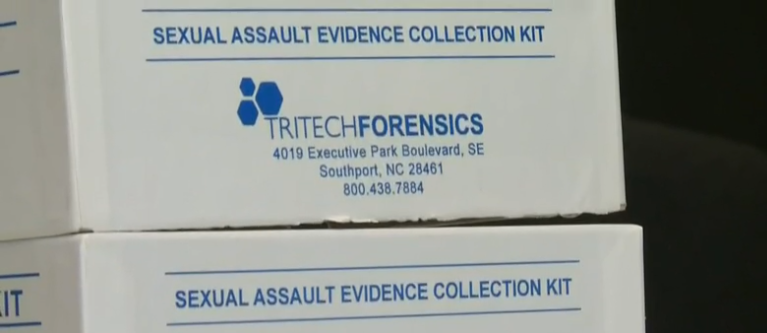Thousands of rape kits logged, tracked one year after N.C. starts tracking system
More than 2,000 new kits and 8,000 old kits were entered into the system, according to the North Carolina Department of Justice.
Enter Article DATE HERE
RALEIGH, N.C. (WMBF) - More than 10,000 sexual assault kits were logged into North Carolina's online tracking system in the first year.
Last October, the state introduced the statewide system to increase accountability and decrease the backlog.
More than 2,000 new kits and 8,000 old kits were entered into the system, according to the North Carolina Department of Justice.
"It is staggering to learn that nearly 2,500 North Carolinians reported being the victim of a sexual assault in just one year," Attorney General Josh Stein said in a press release. "Each of these kits represents a tragedy in a person's life and serves to underscore the need to test these kits and pursue justice for these victims."
[ 'I felt like my body was numb:' Victims reflect on crucial decisions after being raped ]
A sexual assault kit requires victims to undergo an intrusive and lengthy exam to collect evidence from their body. Survivors have describe the process as an extension of the rape. The kits are tested for DNA evidence and can be vital in solving cases and bringing justice to victims.
Despite the intensity of the process and usefulness of the tested kit, they aren't always submitted for testing.
The state implemented the system after discovering more than 15,000 kits were sitting in law enforcement agencies untested. The amount is the highest reported in the country so far, according to the Joyful Heart Foundation.
Many states, including South Carolina, do not have a true idea of how large their rape kit backlog is because of a lack of laws mandating testing and tracking.
In addition to implementing a tracking system, North Carolina received $4 million in grant funding to test untested kits.
Two weeks ago, Governor Roy Cooper signed the Survivor Act into law. The new law allocates $6 million for testing kits and establishes time limits on when kits need to be submitted for testing.
"The survivors of these horrific crimes deserve the strongest possible response from North Carolina. The Survivor Act is just that – meaningful and comprehensive legislation that will both eliminate the backlog we currently have and prevent any backlogs from developing again in the future," Stein said in a press release.
Law enforcement agencies will establish teams to survey their untested kits.
The North Carolina State Crime Lab issued a report this week explaining around 8,000 old kits have been inventoried in Phase 1. This first phase only includes about 30 percent of the state's counties. The N.C. State Crime Lab is working to add kits from the remaining counties.
The report also stated 3,500 new tracking-enabled kits were shipped to medical facilities in the last year. Approximately 45 percent of those kits were associated with a law enforcement report.
In the last year, 601 of the kits were submitted to a lab for forensic testing and a third of those kits have already been tested.
The Charlotte-Mecklenburg Police Department, Raleigh Police Department and the Winston-Salem Police Department reported the highest number of kits. The Charlotte-Mecklenburg Police Department reported 15 percent of the kits.
While North Carolina continues to take steps to address the rape kit backlog, efforts in South Carolina move slower.
In May, WMBF Investigates' special report 'Untested' discovered 1,700 kits are estimated to be untested in South Carolina but the true number could be much higher because most of the Palmetto State's law enforcement agencies failed to respond to a survey.
State lawmakers have tried to get a better idea of how big the problem is but previous tracking and testing bills have failed.
"I look at the state of our laws and I look at sexual assault and say, 'Why in the world do we not have a bill defining consent? Why don't we have a law that gives sexual assault victims rights that the sexual assault bill of rights would?' Some very basic things," Rep. Mandy Powers Norrell told WMBF earlier this year.
A bill introduced by Rep. Gilda Cobb-Hunter, D-Orangeburg, would require the State Law Enforcement Division to create and operate a tracking system for rape kits across the state.
It passed in the House on the last day of the session in early May, but it will need to wait at least eight months before the Senate can vote on the bill.
Copyright 2019 WMBF. All rights reserved.




